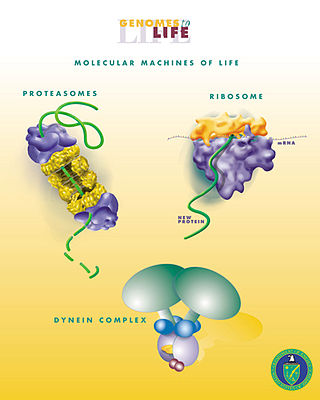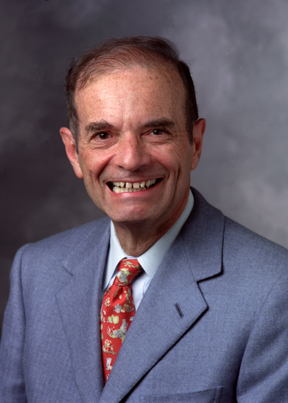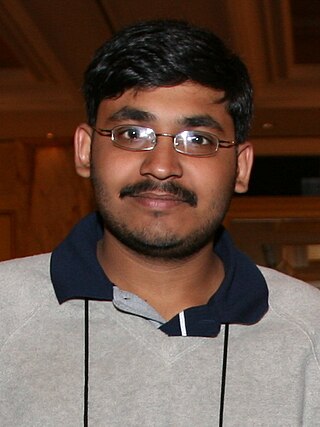
Kendall Newcomb Houk is a Distinguished Research Professor in Organic Chemistry at the University of California, Los Angeles. His research group studies organic, organometallic, and biological reactions using the tools of computational chemistry. This work involves quantum mechanical calculations, often with density functional theory, and molecular dynamics, either quantum dynamics for small systems or force fields such as AMBER, for solution and protein simulations.

Biological engineering or bioengineering is the application of principles of biology and the tools of engineering to create usable, tangible, economically viable products. Biological engineering employs knowledge and expertise from a number of pure and applied sciences, such as mass and heat transfer, kinetics, biocatalysts, biomechanics, bioinformatics, separation and purification processes, bioreactor design, surface science, fluid mechanics, thermodynamics, and polymer science. It is used in the design of medical devices, diagnostic equipment, biocompatible materials, renewable energy, ecological engineering, agricultural engineering, process engineering and catalysis, and other areas that improve the living standards of societies.

Lubert Stryer was the Emeritus Mrs. George A. Winzer Professor of Cell Biology, at Stanford University School of Medicine. His research over more than four decades had been centered on the interplay of light and life. In 2007 he received the National Medal of Science from President Bush at a ceremony at the White House for elucidating the biochemical basis of signal amplification in vision, pioneering the development of high density microarrays for genetic analysis, and authoring the standard undergraduate biochemistry textbook, Biochemistry. It is now in its tenth edition and also edited by Jeremy Berg, Justin Hines, John L. Tymoczko and Gregory J. Gatto, Jr.

Jonathan S. Dordick is an institute professor of chemical and biological engineering at Rensselaer Polytechnic Institute and holds joint appointments in the departments of biomedical engineering and biological sciences. In 2008 he became director of the Center for Biotechnology and Interdisciplinary Studies. In 2012 Dordick became the vice president for research at RPI. He became Special Advisor to the RPI President for Strategic Initiatives in 2018,

Chad Alexander Mirkin is an American chemist. He is the George B. Rathmann professor of chemistry, professor of medicine, professor of materials science and engineering, professor of biomedical engineering, and professor of chemical and biological engineering, and director of the International Institute for Nanotechnology and Center for Nanofabrication and Molecular Self-Assembly at Northwestern University.

Douglas Bruce Kell is a British biochemist and Research Professor of Systems Biology in the Institute of Systems, Molecular and Integrative Biology at the University of Liverpool, and a Co-founder of Epoch Biodesign Ltd. He was previously at the School of Chemistry at the University of Manchester, based in the Manchester Institute of Biotechnology (MIB). He founded and led the Manchester Centre for Integrative Systems Biology. He served as chief executive officer (CEO) of the Biotechnology and Biological Sciences Research Council (BBSRC) from 2008 to 2013.

Harvey Franklin Lodish is a molecular and cell biologist, professor at the Massachusetts Institute of Technology (MIT), Founding Member of the Whitehead Institute for Biomedical Research, and lead author of the textbook Molecular Cell Biology. Lodish's research focused on cell surface proteins and other important areas at the interface between molecular cell biology and medicine.

Linda Gay Griffith is an American biological engineer, and Professor of Biological Engineering and Mechanical Engineering at Massachusetts Institute of Technology, where she also directs the Center for Gynepathology Research.
Laura Lee Kiessling is an American chemist and the Novartis Professor of Chemistry at the Massachusetts Institute of Technology. Kiessling's research focuses on elucidating and exploiting interactions on the cell surface, especially those mediated by proteins binding to carbohydrates. Multivalent protein-carbohydrate interactions play roles in cell-cell recognition and signal transduction. Understanding and manipulating these interactions provides tools to study biological processes and design therapeutic treatments. Kiessling's interdisciplinary research combines organic synthesis, polymer chemistry, structural biology, and molecular and cell biology.
Michael B. Yaffe is an American scientist, professor, surgeon, and retired U.S. Army Reserve Medical Corps Colonel. He is currently the David H. Koch Professor of Biology & Biological Engineering at MIT and a trauma surgeon at the Beth Israel Deaconess Medical Center. In 2016, the United States Army awarded him the Bronze Star Medal for his services as a trauma surgeon on active duty in Afghanistan. He also treated many of the victims of the Boston Marathon bombing.

James Henderson Naismith is Professor of Structural Biology at the University of Oxford, former Director of the Research Complex at Harwell and Director of the Rosalind Franklin Institute. He previously served as Bishop Wardlaw Professor of Chemical Biology at the University of St Andrews. He was a member of Council of the Royal Society (2021-2022). He is currently the Vice-Chair of Council of the European X-ray Free Electron Laser and Vice-President (non-clinical) of The Academy of Medical Sciences. It has been announced that he will be the Head of the MPLS division at Oxford in the autumn of 2023.

Steven R. Tannenbaum was born and grew up in the Rockaways of Queens, New York City. He attended the Hebrew Institute of Long Island through 9th grade, then moved to Hewlett, Long Island where he graduated from Woodmere H.S. in 1954. He attended the Massachusetts Institute of Technology from 1954-1962, earning a B.S. in Food Technology in 1958 and a PhD. in Food Science in 1962. He was then appointed to Assistant Professor in 1964 in the Department of Food Science and Technology leading up to Full Professor in 1974. Throughout his career he was mentored by Samuel A. Goldblith up until his death in 2001. In 1973 Tannenbaum did a sabbatical at the Hebrew University of Jerusalem, where he decided to switch his career into cancer research at the suggestion of Gerald Wogan.

Neuralink Corp. is an American neurotechnology company that is developing implantable brain–computer interfaces (BCIs), based in Fremont, California, as of 2024. Founded by Elon Musk and a team of seven scientists and engineers, Neuralink was launched in 2016 and was first publicly reported in March 2017.
Keith A. Crandall is an American computational biologist, bioinformaticist, and population geneticist at George Washington University, where he is the founding director of the Computational Biology Institute, and professor in the Department of Biostatistics and Bioinformatics.
Dan Hung Barouch is an American physician, immunologist, and virologist. He is known for his work on the pathogenesis and immunology of viral infections and the development of vaccine strategies for global infectious diseases.

Parag Agrawal is an Indian-American software engineer and businessman who was the CEO of Twitter, Inc. from November 2021 to October 2022.
Qing Nie is a mathematician and systems biology researcher. He is a Chancellor's Professor of Mathematics, Developmental and Cell Biology, and Biomedical Engineering at University of California, Irvine. He is also the director of the Center for Mathematical and Computational Biology and the NSF-Simons Center for Multiscale Cell Fate Research at the University.
Linda Jean Broadbelt is an American chemical engineer who is the Sarah Rebecca Roland Professor and associate dean for research of the McCormick School of Engineering and Applied Science at Northwestern University. Her research considers kinetics modeling, polymerization and catalysis.

Peter Karl Sorger is a systems and cancer biologist and Otto Krayer Professor of Systems Pharmacology in the Department of Systems Biology at Harvard Medical School. Sorger is the founding head of the Harvard Program in Therapeutic Science (HiTS), director of its Laboratory of Systems Pharmacology (LSP), and co-director of the Harvard MIT Center for Regulatory Science. He was previously a Professor of Biology and Biological Engineering at the Massachusetts Institute of Technology where he co-founded its program on Computational and Systems Biology (CSBi). Sorger is known for his work in the field of systems biology and for having helped launch the field of computational and systems pharmacology. His research focuses on the molecular origins of cancer and approaches to accelerate the development of new medicines. Sorger teaches Principles and Practice of Drug Development at Massachusetts Institute of Technology and Harvard University.

Lex Fridman is a Russian-American computer scientist and podcaster. Since 2018 he has hosted the Lex Fridman Podcast, where he interviews notable figures from various fields such as science, technology, sports, and politics.













